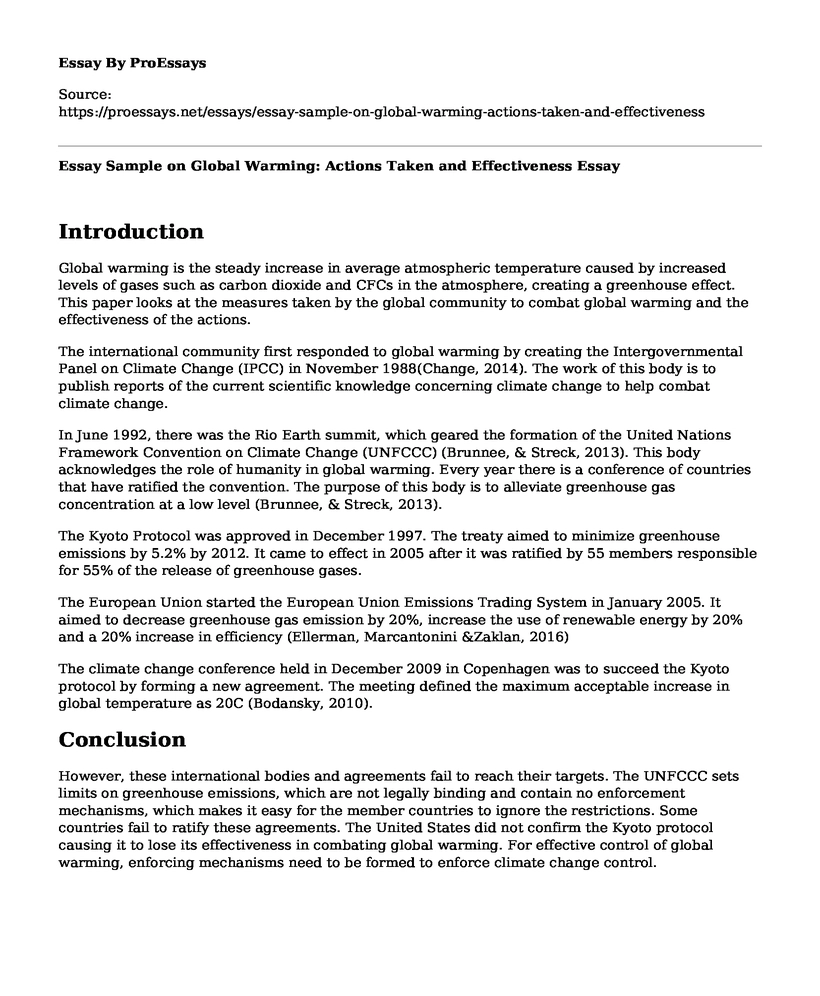Introduction
Global warming is the steady increase in average atmospheric temperature caused by increased levels of gases such as carbon dioxide and CFCs in the atmosphere, creating a greenhouse effect. This paper looks at the measures taken by the global community to combat global warming and the effectiveness of the actions.
The international community first responded to global warming by creating the Intergovernmental Panel on Climate Change (IPCC) in November 1988(Change, 2014). The work of this body is to publish reports of the current scientific knowledge concerning climate change to help combat climate change.
In June 1992, there was the Rio Earth summit, which geared the formation of the United Nations Framework Convention on Climate Change (UNFCCC) (Brunnee, & Streck, 2013). This body acknowledges the role of humanity in global warming. Every year there is a conference of countries that have ratified the convention. The purpose of this body is to alleviate greenhouse gas concentration at a low level (Brunnee, & Streck, 2013).
The Kyoto Protocol was approved in December 1997. The treaty aimed to minimize greenhouse emissions by 5.2% by 2012. It came to effect in 2005 after it was ratified by 55 members responsible for 55% of the release of greenhouse gases.
The European Union started the European Union Emissions Trading System in January 2005. It aimed to decrease greenhouse gas emission by 20%, increase the use of renewable energy by 20% and a 20% increase in efficiency (Ellerman, Marcantonini &Zaklan, 2016)
The climate change conference held in December 2009 in Copenhagen was to succeed the Kyoto protocol by forming a new agreement. The meeting defined the maximum acceptable increase in global temperature as 20C (Bodansky, 2010).
Conclusion
However, these international bodies and agreements fail to reach their targets. The UNFCCC sets limits on greenhouse emissions, which are not legally binding and contain no enforcement mechanisms, which makes it easy for the member countries to ignore the restrictions. Some countries fail to ratify these agreements. The United States did not confirm the Kyoto protocol causing it to lose its effectiveness in combating global warming. For effective control of global warming, enforcing mechanisms need to be formed to enforce climate change control.
Reference
Bodansky, D. (2010). The Copenhagen climate change conference: a postmortem. American Journal of International Law, 104(2), 230-240.
Brunnee, J., & Streck, C. (2013). The UNFCCC as a negotiation forum: towards common but more differentiated responsibilities. Climate Policy, 13(5), 589-607.
Change, I. P. O. C. (2014). IPCC. Climate change.
Ellerman, A. D., Marcantonini, C., & Zaklan, A. (2016). The European Union emissions trading system: ten years and counting. Review of Environmental Economics and Policy, 10(1), 89-107.
Cite this page
Essay Sample on Global Warming: Actions Taken and Effectiveness. (2023, Apr 08). Retrieved from https://proessays.net/essays/essay-sample-on-global-warming-actions-taken-and-effectiveness
If you are the original author of this essay and no longer wish to have it published on the ProEssays website, please click below to request its removal:
- Relationship Between Environment and Cancers Paper Example
- Essay Sample on New Zealand's History of Climate Change
- Essay Sample on the Major Causes and Effects of Climate Change
- The Significance of Flint Towards Environmental Injustice - Essay Sample
- Argumentative Essay on Measure of Preventing Ocean Pollution
- Climate Change: Causes, Impacts, & Solutions - Research Paper
- Environmental Conservation: Protecting Nature for Our Future - Essay Sample







